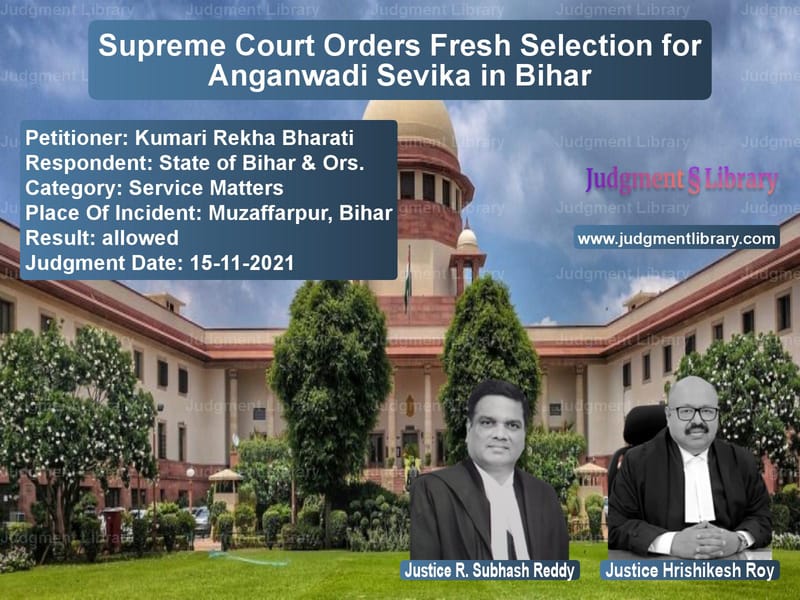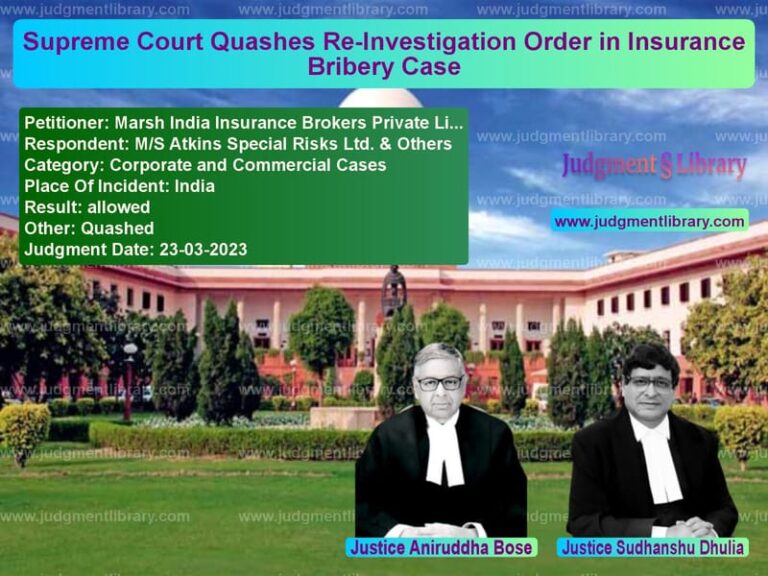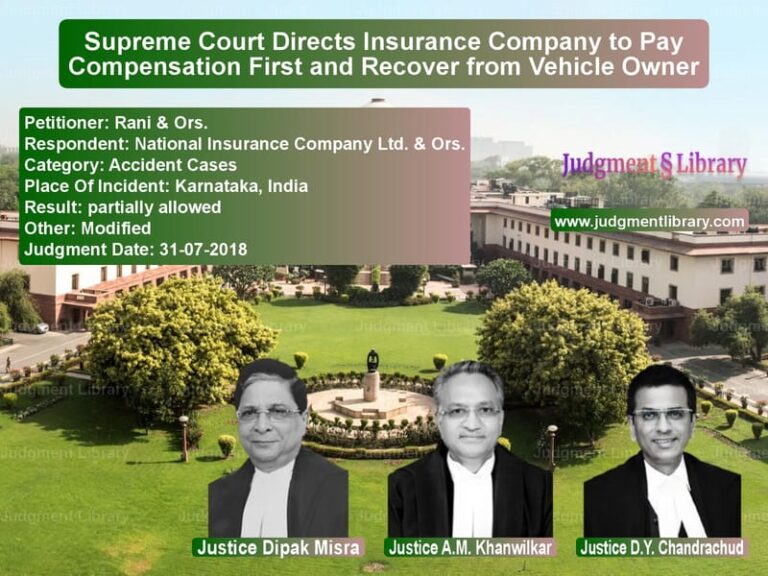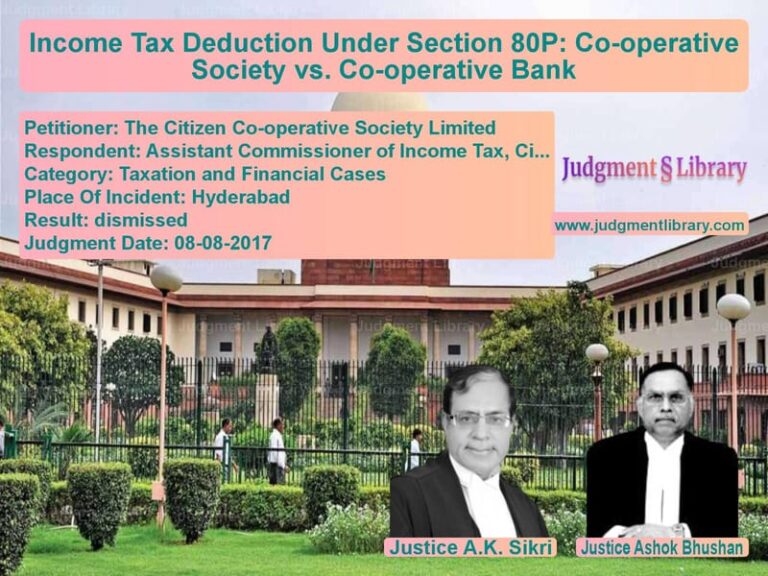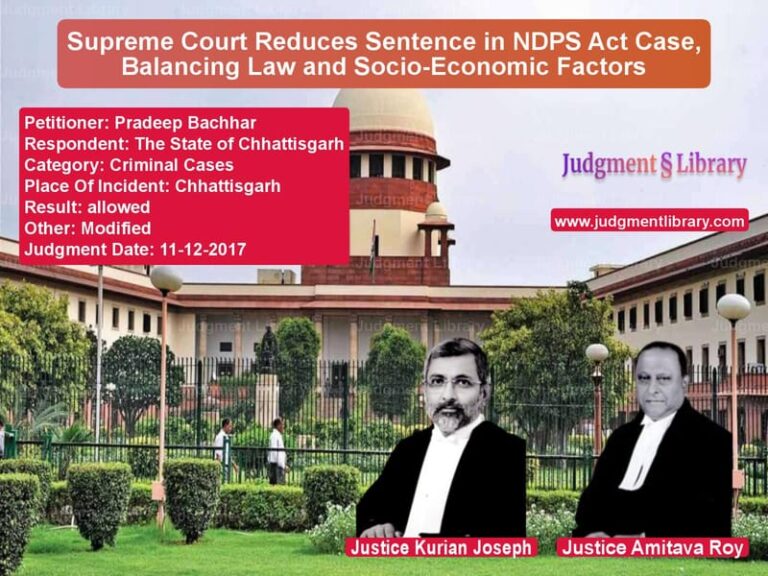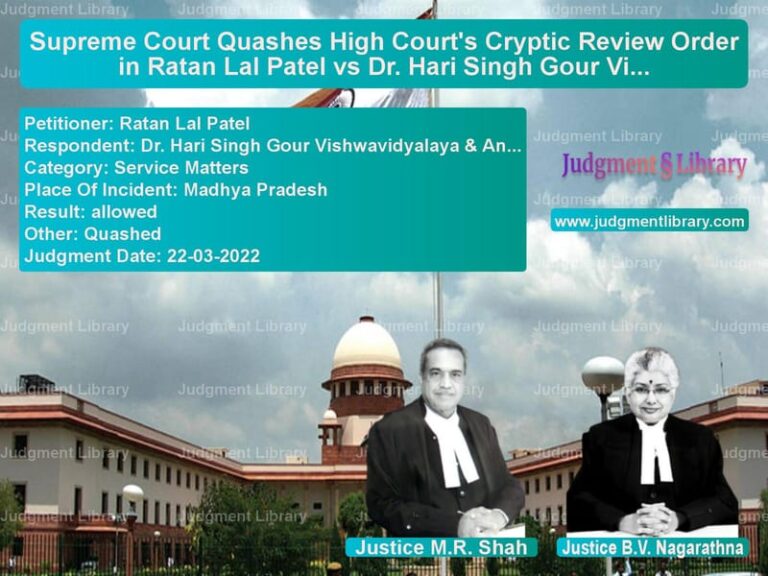Supreme Court Orders Fresh Selection for Anganwadi Sevika in Bihar
The case of Kumari Rekha Bharati v. State of Bihar & Ors. pertains to the eligibility criteria for appointment as an Anganwadi Sevika in Bihar. The Supreme Court set aside the Patna High Court’s ruling, holding that the interpretation of the selection guidelines by the High Court was incorrect. The Court ordered fresh selection for the position in question.
The judgment clarifies the application of selection rules and underscores that eligibility must be determined strictly as per the prevailing guidelines without introducing distinctions that were not explicitly provided.
Background of the Case
In 2006, the Gram Panchayat Mirapur, Bihar, issued an advertisement inviting applications for the post of Anganwadi Sevika. A merit list was prepared, placing the respondent (9th respondent in the appeal) at the top, while the appellant, Kumari Rekha Bharati, was ranked second.
The respondent’s selection was challenged on the ground that her father was a government teacher, making her ineligible as per Clause 3(E) of the selection guidelines. Based on this challenge, the District Magistrate of Muzaffarpur canceled the respondent’s appointment in 2013. The Commissioner of Tirhut Division upheld this decision.
The respondent filed a writ petition before the Patna High Court, which ruled in her favor, reinstating her appointment. The appellant then approached the Supreme Court.
Arguments by the Petitioner
Kumari Rekha Bharati, represented by her counsel, argued:
- The respondent was ineligible for appointment as her father was a government teacher, violating Clause 3(E) of the guidelines.
- The High Court misinterpreted the rules by making a distinction between married and unmarried daughters, which was not present in the guidelines.
- The District Magistrate and the Commissioner correctly applied the selection criteria, and their decisions should not have been overturned.
Arguments by the Respondent
The respondent, represented by counsel, countered:
- She was married and residing in Muzaffarpur, while her father was a government teacher in Vaishali, a different district.
- The eligibility restriction in Clause 3(E) should apply only to unmarried daughters residing with their parents.
- The High Court rightly held that the restriction was inapplicable to married daughters living in separate households.
Supreme Court’s Judgment
The Supreme Court, comprising Justices R. Subhash Reddy and Hrishikesh Roy, ruled in favor of the appellant, stating:
“For the purpose of considering eligibility, the guideline as indicated under sub-clause (E) is to be construed as it reads. No distinction can be drawn between a married daughter and an unmarried daughter for the purpose of considering eligibility as per the guidelines.”
The Court found that the High Court had erred in modifying the selection criteria. It noted:
- The selection guidelines did not differentiate between married and unmarried daughters.
- The eligibility restriction applied uniformly to all daughters of government employees.
- The High Court’s interpretation was contrary to the plain meaning of the guidelines.
However, since Clause 3(E) was struck down by the High Court in 2010, the Supreme Court did not reinstate the appellant’s appointment. Instead, it ordered fresh selection:
“As much as the selection relates to the year 2006, we have to consider the guidelines which were applicable during the relevant time. At the same time, in view of the subsequent development, no direction can be granted to appoint the appellant, and selections are to be made by issuing fresh notification.”
Conclusion
The Supreme Court’s decision reaffirms that eligibility criteria must be applied as written and not altered through judicial interpretation. The ruling ensures that future appointments follow the prescribed guidelines while also allowing fresh selection in cases where rules have since changed. The judgment serves as an important precedent in cases involving government employment eligibility.
Read also: https://judgmentlibrary.com/supreme-court-dismisses-crpf-appeal-in-manoj-mishra-case/
Petitioner Name: Kumari Rekha Bharati.Respondent Name: State of Bihar & Ors..Judgment By: Justice R. Subhash Reddy, Justice Hrishikesh Roy.Place Of Incident: Muzaffarpur, Bihar.Judgment Date: 15-11-2021.
Don’t miss out on the full details! Download the complete judgment in PDF format below and gain valuable insights instantly!
Download Judgment: kumari-rekha-bharati-vs-state-of-bihar-&-ors-supreme-court-of-india-judgment-dated-15-11-2021.pdf
Directly Download Judgment: Directly download this Judgment
See all petitions in Recruitment Policies
See all petitions in Public Sector Employees
See all petitions in Judgment by R. Subhash Reddy
See all petitions in Judgment by Hrishikesh Roy
See all petitions in allowed
See all petitions in supreme court of India judgments November 2021
See all petitions in 2021 judgments
See all posts in Service Matters Category
See all allowed petitions in Service Matters Category
See all Dismissed petitions in Service Matters Category
See all partially allowed petitions in Service Matters Category

